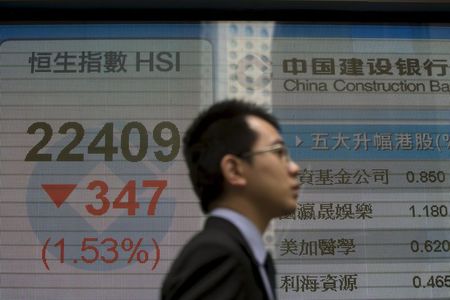Asia stocks dip amid rates, election uncertainty; China shares drift higher
2024.10.21 22:20

Investing.com– Most Asian stocks fell on Tuesday as uncertainty over interest rates and the U.S. presidential election kept traders largely risk-averse, while Chinese markets drifted higher after an interest rate cut.
Regional markets took a weak lead-in from Wall Street, as U.S. stock benchmarks retreated from record highs as Treasury yields rose and as the earnings season loomed.
U.S. stock index futures were mildly negative in Asian trade.
Investors were now largely awaiting the U.S. presidential elections, which are just about two weeks away. Republican nominee Donald Trump was seen gaining better odds against Vice President Kamala Harris in recent polls.
Focus this week was also on a string of key U.S. earnings, with Asian earnings set to pick up in the coming weeks.
Japan’s Nikkei leads losses despite yen weakness
Japan’s was the worst performer in Asia, losing 1.7%, while the index shed 1.1%.
Losses in Japanese shares came even as the touched its weakest level in nearly three months, as the currency was pressured by uncertainty over the Bank of Japan’s capacity to raise interest rates further. A weaker yen usually benefits export-oriented Japanese stocks.
Japanese general elections are set to take place later this month, while the BOJ is set to meet at the end of October.
Before that, is due later this week and is likely to factor into the outlook for Japanese interest rates.
Broader Asian stocks retreated. South Korea’s lost over 1%, while Australia’s shed 1.4%, with the latter seeing heavy profit-taking after hitting record highs earlier in October.
Futures for India’s index pointed to a flat open, as the index lost ground amid profit-taking and some middling earnings from major Indian companies.
Chinese stocks advance after rate cut
Chinese markets were the sole bright spot in Asia, with the and indexes rising between 0.2% and 0.3% in choppy trade. Hong Kong’s index added 0.4%.
Chinese stocks took some cheer from a slightly bigger-than-expected cut to the People’s Bank of China’s benchmark on Monday.
The rate cut came as the latest in a flurry of recent stimulus measures from Beijing to shore up economic growth.
While optimism over the measures initially drove Chinese markets to two-year highs in October, doubts over the timing and scale of the measures pulled Chinese stocks off these peaks.








